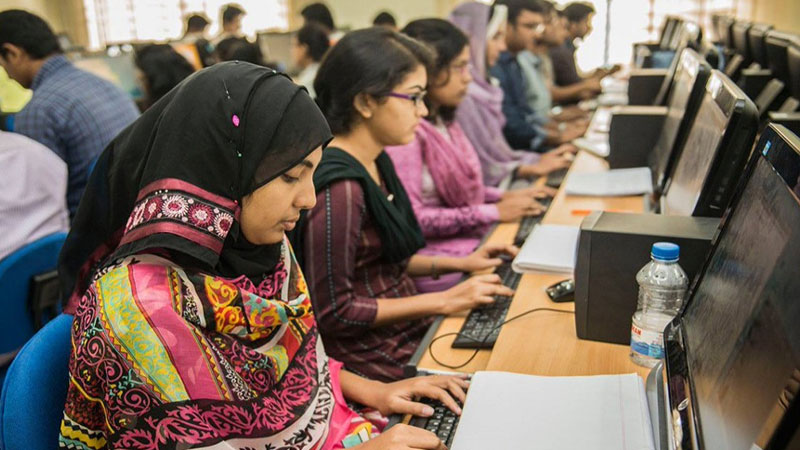GET IN TOUCH
- Please wait...

This letter was originally sent to LightCastle Bimonthly Newsletter subscribers.
Bangladesh is set to become a trillion-dollar economy over the next decade. While there are short-term challenges fueled by inflation, declining forex reserve and currency devaluation, the economy is expected to recover towards the end of 2025 and long-term vitals for Bangladesh are positive.
As the growth happens – Bangladesh needs to focus on becoming an innovation-driven economy rather than a factor-driven one. To do that, the country will need a renewed focus on STEM (Science, Technology, Engineering, Mathematics) as well as gender equity.
Female students have consistently outperformed their male counterparts in primary and secondary degree levels. However primary enrollment for females drop from 122% to 20% at the tertiary level while only 1.5% pursue engineering degrees. Moreover, among those who graduate often opt out of STEM track careers or discontinue careers due to family commitments. This has led to lower representation in leadership positions.
The benefits of a more equitable workforce are evident starting from better productivity, higher innovation levels and improved team dynamics. Alongside, we also see when women become more empowered there are higher degrees of investments in social advancement including education and health. Lastly, by ensuring equitable participation, we will have the mix of the best brains to drive inclusive growth for Bangladesh.
So how do we bridge this gap and ensure more equity? Three things that would help are:
1. Educational reforms to include a more engaging STEM curriculum while giving early exposure to STEM opportunities and role models via talks and networks. Where relevant provide scholarships to girls pursuing STEM tracks. However, this needs to go hand in hand with community engagement and engaging with parents to combat any existing bias.
2. Industry partnerships and supportive policies including equal opportunity in hiring, affirmative action for better work-life management practices like flexible work hours, child care support and hybrid offices and closer collaboration with academia like internship exposure during university gap times and co-designing of the curriculum will support more women in career tracks.
3. Policy Support from the government, given they are one of the largest employers, can help set precedence. This can start with establishing best practice frameworks at the national level on how to support women in STEM education and workplace diversity. Building use cases within specific government institutions will encourage public and private sector actors to take up similar roles.
Bangladesh has always benefited extensively from strong female contribution whether at the root level or at the very top in leadership roles of the country. Therefore, we have an opportunity to supercharge ourselves and go forward towards a path towards not just 42% female workforce participation but aim towards 100%.
Our experts can help you solve your unique challenges
Stay up-to-date with our Thought Leadership and Insights